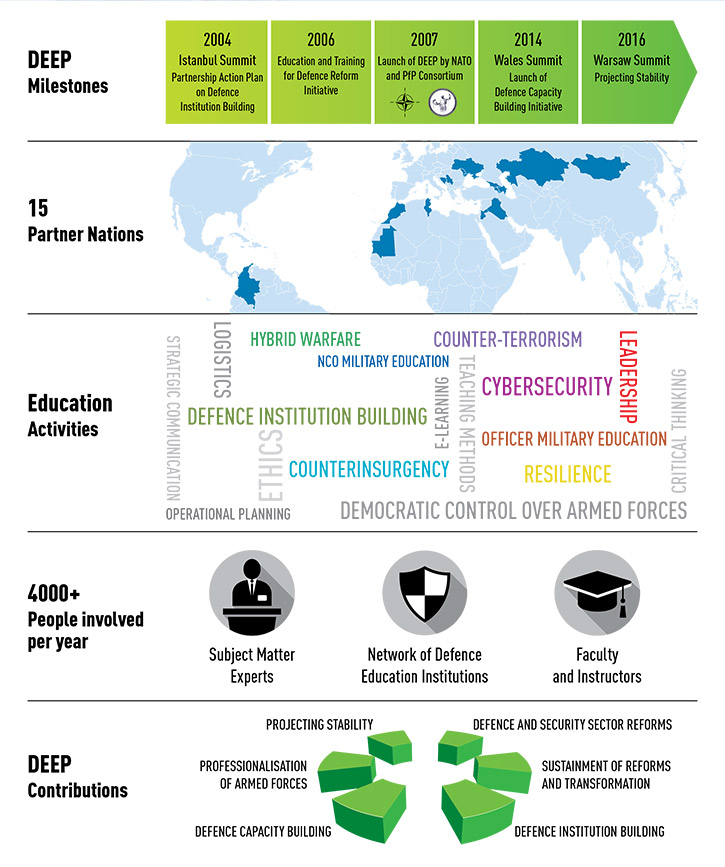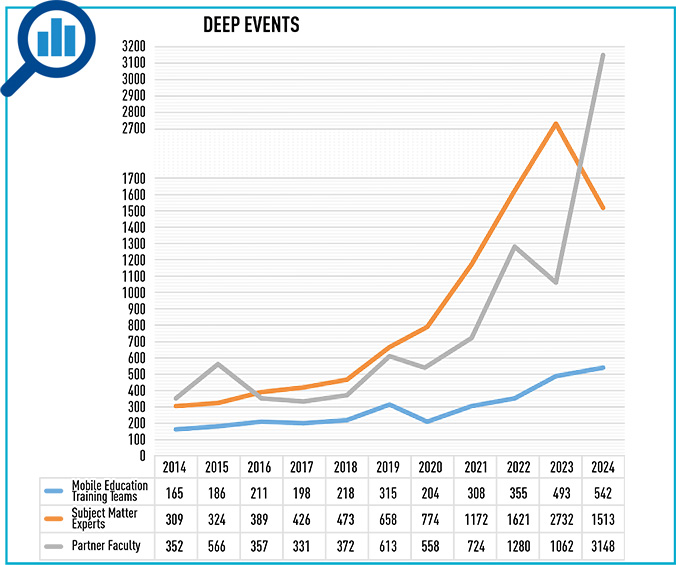Defence Education Enhancement Programme (DEEP)
The Defence Education Enhancement Programme (DEEP) is a vehicle for reform, providing tailored practical support to individual countries in developing and reforming their professional military education institutions. Through faculty development, curriculum development and peer-to-peer activities and engagements, NATO’s DEEP programme fosters defence capacity and institution building. By enhancing democratic institutions, it makes an important contribution to NATO’s efforts to project stability in the Euro-Atlantic area and beyond.

- The DEEP programme is demand-driven to meet national needs in support of objectives that are laid out in bilateral partnership cooperation programmes between NATO and individual countries.
- Expert advice is offered to the defence sector and its education institutions seeking to become intellectually interoperable with the Alliance.
- With the support of more than 900 experts from approximately 75 security and defence education institutions in NATO member states and partner countries, DEEP assists host countries to respond to the most pressing requirements for modernisation and reform.
- Currently, DEEP initiatives are ongoing in Armenia, Azerbaijan, Bosnia and Herzegovina, Colombia, Georgia, Iraq (as part of NATO Mission Iraq), Jordan, Kazakhstan, Mauritania, the Republic of Moldova, Mongolia, Morocco, Serbia, Tunisia and Ukraine.
What is the DEEP programme?
The Defence Education Enhancement Programme works with partner countries to help identify the needs and gaps of education institutions in the defence and military domain. The two main components – curriculum development and faculty development – are bolstered by dialogue between institutions in partner and NATO countries as well as peer-to-peer activities and engagements among subject-matter experts.
Institutional adaptation
DEEP helps partners to modernise and professionalise the organisational structure of professional military education institutions and provides solutions to build quality assurance processes within the system.
Curriculum development – what to teach
The DEEP programme works closely with professional military education institutions to assist in the development of specific curricula on virtually any subject requested by the partner country. To support this work, NATO and the Partnership for Peace Consortium of Defense Academies and Security Studies Institutes (PfP Consortium) have produced 10 reference curricula on Defence Institution Building, Professional Military Education for Officers, Professional Military Education for Non-Commissioned Officers, Instructor Development of Non-Commissioned Officer Schools, Cybersecurity, Counter-Insurgency, Counter-Terrorism, Hybrid Threats and Hybrid Warfare, Leadership and Ethics, Resilience, and Building Integrity, as well as reference guidance on Non-Commissioned Officer Corps Professional Development, and the Russian War Against Ukraine Lessons Learned Curriculum Guide.
Faculty development – how to teach
DEEP features specialised engagement on pedagogy to provide institutions and instructors with access to the latest teaching methods and to support their efforts to foster critical thinking in the classroom. In order to further professionalise the faculty development of military educational institutions, NATO and the PfP Consortium have produced the Faculty Development Curriculum Guide.
Relying on voluntary contributions, NATO steers policy and the PfP Consortium leads on academic support facilitating the network of institutions and individual academics and practitioners who contribute through the PfP Consortium's Education Development Working Group.
| Policy | Academics |
| DEEP experts | Education Development Working Group |
| NATO International Staff | Faculty Development |
| NATO International Military Staff | Curriculum Development |
| Allied Command Transformation | Academic Leads |
In an effort to support the growing demands for assistance in the development of the Non-Commissioned Officer (NCO) Corps with regards to its professionalisation and education, DEEP has established an NCO Working Group to meet partners' requests. The main focus for NCO DEEP is the development of professional military education at the request of the partner country seeking assistance. However, sometimes these efforts also identify areas that are necessary to develop a professional NCO Corps but lie beyond the immediate scope of education (e.g. improving the roles and responsibilities of their NCOs, or establishing command teams at all levels of commands). With these additional recommendations, the DEEP programme works with armed forces to modernise their NCO Corps in order to provide capabilities that will not only support their country's priorities but also NATO's requirements. As a result, NATO also offers NCO Corps Professional Development as a vector for transformation of respective countries' military organisations in order to emphasise the importance of having a professional NCO Corps.
The DEEP Advanced Distributed Learning (ADL) Portal is a platform for exchanging knowledge and generating ideas related to distance learning, and the popularisation, promotion and dissemination of ideas. The DEEP ADL Portal is intended to be a comprehensive solution that not only allows deeper cooperation within the programme, but also influences its popularisation and dissemination, and thus increases the reach of the programme. At the same time, it creates a compendium of expertise in the use and/or implementation of new technologies for distance-learning education and training courses. To reinforce this line of effort, the DEEP programme has also developed its Strategy for Distance Learning Support.
Annual Clearing House on Defence Education
NATO draws on an ad-hoc network of contributors who offer their services through an annual Clearing House on Defence Education, which serves as a forum for Allies and partners to coordinate efforts and inform institutions and countries about the status of their respective DEEP programmes. Led by the Operations Division at NATO Headquarters and with the support of the PfP Consortium, the annual Clearing House is an effective tool to identify partner requirements and align them with donor expertise.
- See our DEEP Factsheet
- See our Factsheet on DEEP Reference Curricula and Guidance Documents
- See our DEEP Brochure
The relevance of defence education
There is a clear role for defence education in developing stable defence and military institutions. The defence and related security sector require an integrated strategic approach. Joint training and joint planning with partners and representatives from international organisations and civil society are especially important. Defence education cultivates an aspiration to excellence and contributes to NATO's efforts to project stability and build defence capacity in the Euro-Atlantic area.
Building up a good defence education system takes time. Modernising defence training and education provides an important opportunity to respond to the prevailing deficits in global governance. To get military education right, armed forces must have a clear and comprehensive vision of the military education and training system for officers – from the cadet course training lieutenants to the colonels' course educating strategists. Research and education must be tied together. In modern armed forces, professional military education has also become key for NCOs, who often act in roles that historically have only been taken on by officers. To maintain a sound education system, curricula must be developed by education professionals in dialogue with defence staffs and respective institutions.
How does the DEEP programme work?
Any NATO partner country that has an individual bilateral cooperation plan with the Alliance can request the development of a DEEP programme. When a country requests a DEEP programme, a multinational DEEP assessment team visits the country to scope out the potential programme with their interlocutors. Based on the assessment visit, the DEEP team creates a proposed action plan, usually with a three-year duration. Once the partner approves the action plan and funding is identified, the DEEP academic lead assembles and allocates the appropriate expertise from a vast transatlantic network of experts that is managed jointly by NATO and the PfP Consortium's Education Development Working Group.
Measures of effectiveness
The level of progress and transformation depends on how much effort education institutions make to operationalise change derived from the conduct of DEEP activities, particularly in the areas of faculty development and curriculum development. Categories of measure of effectiveness vary from country to country and the following are identified as the most relevant:
- Adoption of modern professional military education academic structures and degree requirements;
- Adoption of modern teaching methodologies by professional military education faculty;
- Inclusion of new subject matter in existing course curricula and development of new courses;
- Adoption of Non-Commissioned Officers' education;
- Support of senior partner country and defence education institution leadership for DEEP programmes;
- Contribution of partner country educators and NCO experts (military and civilian) in DEEP programmes.
DEEP objectives are met when the partner's professional military education institution is self-sufficient and no longer requires external assistance, its curriculum satisfies all course needs, and a process exists to ensure a continuous curriculum review. The professional military education institution faculty should be able to teach all classes using modern teaching techniques and have an internal sustainment capability to train their new faculty in modern teaching methodology.
DEEP in numbers
2013: 85 events, 162 subject matter experts, 245 partner faculty members
2014: 165 events, 309 subject matter experts, 352 partner faculty members
2015: 186 events, 324 subject matter experts, 566 partner faculty members
2016: 211 events, 389 subject matter experts, 357 partner faculty members
2017: 198 events, 426 subject matter experts, 331 partner faculty members
2018: 218 events, 473 subject matter experts, 372 partner faculty members
2019: 315 events, 658 subject matter experts, 613 partner faculty members
2020: 204 events (online and in-person), 774 subject matter experts, 558 partner faculty members
2021: 308 events (online and in-person), 1172 subject matter experts, 724 partner faculty members
2022: 355 events (online and in-person), 1621 subject matter experts, 1280 partner faculty members
2023: 493 events (online and in-person), 2732 subject matter experts, 1062 partner faculty members
2024: 542 events (online and in-person), 1513 subject matter experts, 3148 partner faculty members

The evolution of DEEP
At the NATO Summit in Istanbul in 2004, Allies launched the Partnership Action Plan on Defence Institution Building (PAP-DIB), which was endorsed by leaders from partner countries in a meeting of the Euro-Atlantic Partnership Council (EAPC). PAP-DIB reflects common views on modern and democratically responsible defence institutions. It provides a definition of defence reform and a framework for common reflection and exchange of experience on related problems. It aims to assist interested partners to reform and restructure their defence institutions to meet their needs and international commitments.
To support the implementation of the defence education component of PAP-DIB, in February 2006, Allies launched the Education and Training for Defence Reform Initiative. Its aim is to create an EAPC-wide collaborative mechanism and tools to help implement PAP-DIB by supporting education of civilian and military personnel in efficient and effective management of national defence institutions under civil and democratic control. This initiative provided the underlying framework that led to the development of DEEP in 2007 by NATO together with the PfP Consortium.
Support for defence education, training and capacity-building was reaffirmed in a new Policy for an Active Engagement in Cooperative Security: a More Efficient and Flexible Partnership Policy, agreed by NATO Foreign Ministers in April 2011.
At successive NATO Summits, Allies have declared their commitment to strengthening cooperation with partners, upon request, to build stronger defence institutions, improve good governance, enhance their resilience, provide for their own security, and more effectively contribute to the fight against terrorism. This investment in partners' security contributes to Alliance security.
DEEP-Afghanistan
From 2010 until 2021, the DEEP programme aimed to develop the capacity of Afghan national defence and security education institutions. The programme focused on professional military education (PME) and development with the Marshal Fahim National Defence University (MFNDU) as the main interlocutor. The main priorities were senior leader professional education, faculty and curriculum development, and PME school institutional support.
During this period, the MFNDU made concrete achievements, attaining a high level of co-ownership and implementing recommendations and lessons learned identified during various DEEP events (workshops, seminars, Annual Programme Review, etc.). A special focus was also given to gender balance and interagency approaches.
Following the end of NATO's operation in Afghanistan in August 2021, DEEP-Afghanistan is now suspended. Nevertheless, 10 years' experience with DEEP-Afghanistan confirms that strategic investment and strategic patience are imperative, and demonstrates that there is a need for generational investments in education and capacity-building in order to have viable, self-sustainable institutions.
